Two
Choose the right timing
OCM Globe
building the No.1 Chinese food and beverages distribution platform by choosing the perfect timing
“ There is no so-called Jack Ma era, only an era in which there is Jack Ma.”
⸺ People’s Daily
Time makes heroes, with a combination of trend and timing. Only if we can correctly
recognize our times and deeply understand the macroeconomic situations, the
company will be able to adapt itself to overcome the short-term hard times and seize
the long-term trend.
Electric car was not born in the 21st century. In fact, Thomas Davenport invented the
battery-powered car as early as 1834, the first electric car in the world. By the
beginning of 20th century, electric car, internal combustion engine car and steam-powered car contributed equally to the total automobile industry in the United States.
In 1899, American engineer Walter Baker founded the Baker Motor Vehicle Company in
Cleveland, focusing on electric automobile. The first Baker vehicle was priced at 850
dollars. It was sold to the inventor Thomas Edison and the American president William
Howard Taft. In 1906, Baker Motor Vehicle Company was already the largest electric
automobile manufacturer in the world. In 1910, Baker’s new chief engineer, Emil
Gruenfeldt, set a world record for distance driven on a single charge with 323km. In the
early 20th century, to overcome the inconvenience of charging, similar to what electric
manufacturers are doing nowadays, Baker Company invested in battery-charging
infrastructure. The company announced plans to open stations at every major
intersection in Cleveland and to grow the network from there, although this effort
became cost prohibitive and never came to fruition. The actions taken by Baker
Company in the 20th century seem to be not outdated even under current context.
Unfortunately, the ideas and actions were too forward-looking. Consequently, there
were not accepted and implemented.
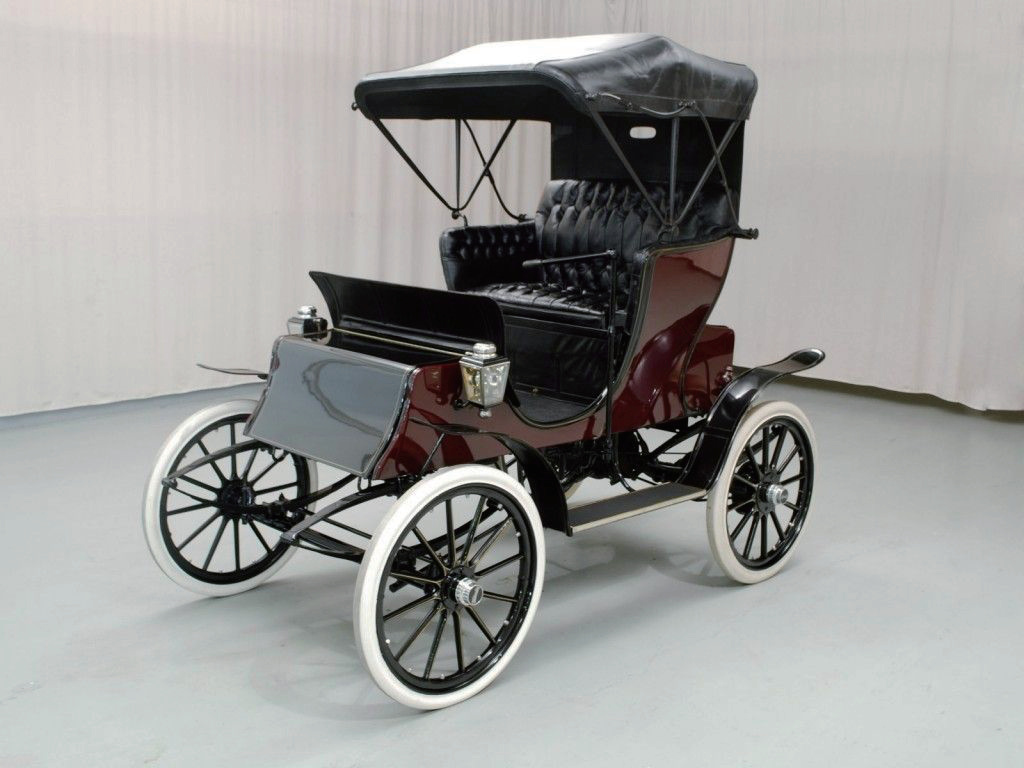
Illustration 2.1 The Baker Electric Car in 1903
In 1910, Ford introduced the mass-produced internal combustion engine car with
significant reduction in costs. The heavy battery of Baker cars made it notorious for its
small space, weak engine and complicated maintenance. Baker Company almost lost
the electric car business overnight. Eventually, Baker Company filed bankruptcy in
1966 after a few failure attempts at reestablishing the market.
Within less than 7 years following Baker’s bankruptcy, during the 1973 Arab-Israeli War,
Arab members of the Organization of Petroleum Exporting Countries (OPEC) imposed
an embargo against the United States in retaliation for its decision to supply the Israeli
military. As a consequence, the petrol price was skyrocketing. In order to alleviate the
reliance on petrol, many countries started to announce favorable policy to support the
development of electric vehicles.
Toyota Prius was introduced at the end of October 1997 right after the energy crisis. It
is the first mass-produced hybrid electric vehicle. Toyota Prius revolutionarily reduces
the energy consumption and exhaust emission. Basing on the volume of CO2
emission, US Environmental Protection Agency and California Air Resources Board
recognize that Prius is the cleanest and the most petrol efficient vehicle in the United
States. United Kingdom Department for Transport ranks the CO2 emission of Prius as bottom 2. In 25 years, Prius has sold 5 million units, helping Toyota become the No.1 in
sales unit among global automobile manufacturers.
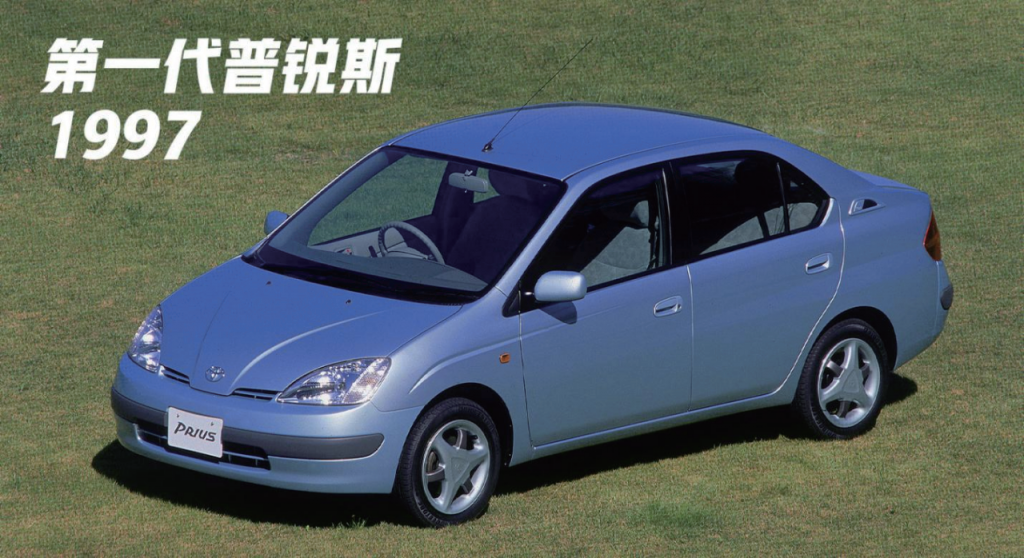
Illustration 2.2 The 1st Generation of Prius in 1997
On the 1st July 2003, Tesla Motors was founded. Tesla’s mission is “to accelerate the
advent of sustainable transport”. In 2008, Tesla unveiled its first car – an open two-seat
sports car Roadster; In 2012, the second car was released – the Model S luxury
electric sedan; the third car was named Model X, luxury electric SUV, hit the market in
September 2015; the fourth car was economy sedan Model 3, launched at the end of
2017. By October 2022, Tesla has sold 3.23 million units worldwide. Currently, Tesla
has a market value over 600 billion dollars, the global No.1 in automobile industry.
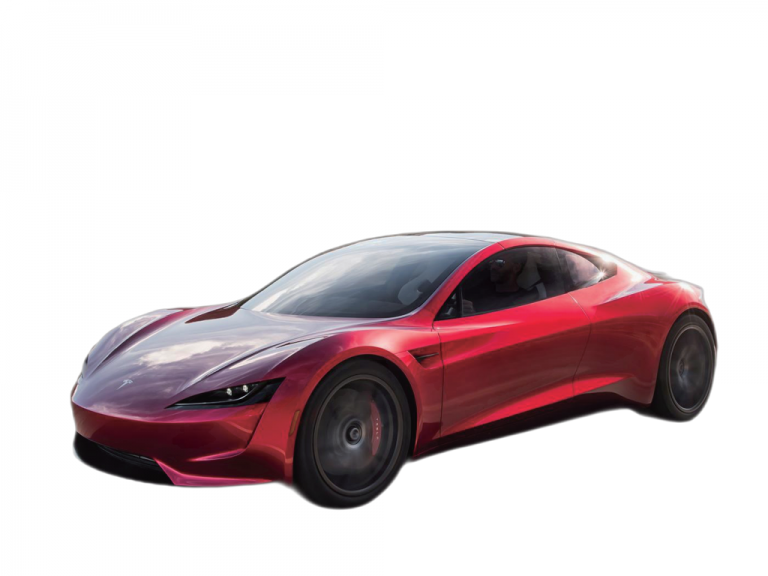
Illustration 2.3 Tesla’s First Car – Roadster
BYD (Biyadi) Company was also founded in 2003, who is the global No.2 in automobile
industry.
With the same objective of developing electric car, what made the difference among
Baker, Toyota, Tesla and BYD?
Times.
JFC Benefiting from the Increasing Population of Asian Americans
In 2020, the total population in the United States reached 330 million. Compared to the
size a decade ago, there was only 7.4% growth, among which the population of Asian
Americans grew over 30%, the fastest of all. The population of Asian Americans
reached 24 million by 2020, contributing 7% of the total population. According to the
forecast of Pew Research Center, till the middle of this century, the population of Asian
Americans will be 46 million, exceeding Spanish Americans, becoming the largest
immigrant groups.
JFC International, founded in 1958, is a well-known wholesaler and distributor of
Japanese and Asian food products in the United Sates. Japanese KIKKOMAN group,
known for its soy sauce and sake products, acquired JFC International in 1970. In the
following 40 years, JFC International expanded its business by importing and
distributing more Japanese and Asian food products, including rice, packaged food
and snacks etc. Nowadays, besides distributing major brands such as Itoen, Yakult
and Sapporo, JFC International also owns popular brand such as Nongshim from
Korea and Suntropics from Southeast Asia. JFC International imports and distributes
more than 15,000 products from Asia. The revenue of KIKKOMAN group reached its
highest level with a record of 2.98 billion dollars.
OCM Benefiting from the Increasing Population of New Immigrants from Mainland China
2017 is a critical milestone year, which marked that for the first time the new
immigrants from Mainland China contributed over 50% of Chinese Americans in the
United States. Besides, over recent ten years, Chinese has been the top source of
international students in the United States. In 2021, international students from China
reached 348,900 people, followed by India. China and India together accounted.
71.9% of the total international students in the United States. The demographic
change brings market needs change. Asian Americans, especially Chinese Americans,
need more and more food and beverages from mainland China. However, the reality is
that the share of shelf of Chinese food and beverage brands is less than 10% in the
United States.
The newly founded OCM took this perfect timing, focusing on importing and
distributing top Chinese food and beverage brands in the United States since 2018,
with the mission of “making the world adore and adopt Chinese tastes” and the vision
of “becoming the JFC for Chinese foods”. The brands OCM distributes fall into two
groups. The first group is the top brands of Chinese food and beverages which have
heritage for dozens of year, such as Arawana, Mengniu and Wanglaoji. All those brands
have strong brand equity and take leading share of mind across all different
generations. The other group is the newly popular brands, such as Genki Forest and
Saturnbird. Those brands have high level of awareness among Gen Z and international
students thanks to massive communications on the internet. No matter the brands with
heritage or the brands newly created, all of them help OCM build a solid starting point,
paving the way to expand into the national markets in the United States. From the
market expansion perspective, OCM set up its sales offices and warehouses in
Chinese populated cities, starting from Los Angeles, followed by New York, Chicago,
Huston, San Francisco and Atlanta etc., from centers to suburban areas, constantly
enhancing the distribution networks.
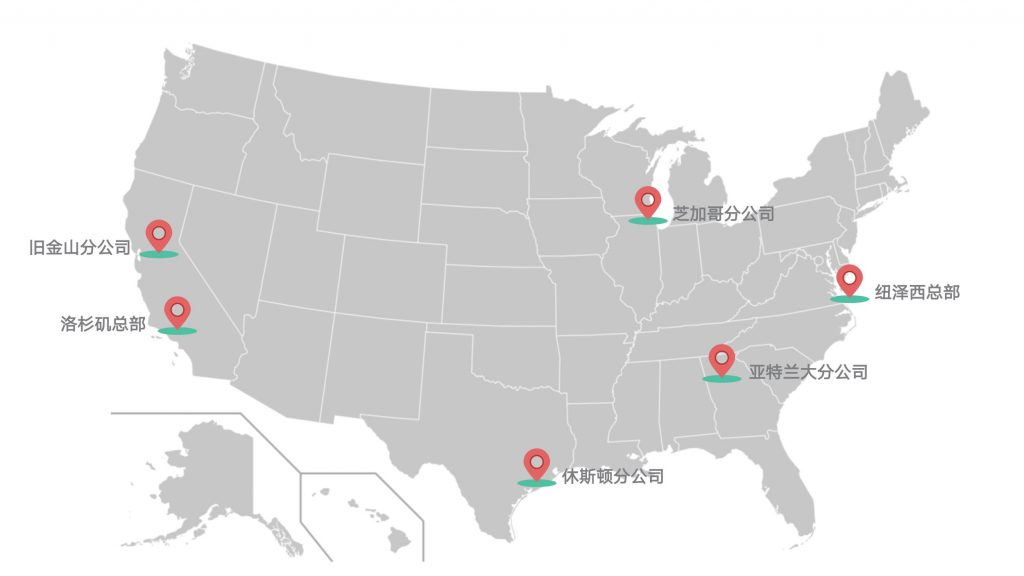
Illustration 2.4 OCM Offices across the United States
Regarding the marketing communication, OCM invests in both online and offline
media. OCM participates all types of exhibitions in China, such as China Food & Drinks
Fair (CFDF), China Import and Export Fair and SIAL China, actively introducing the
oversea opportunities for Chinese food and drinks manufacturers. Meanwhile, OCM
holds events similar with CFDF – the United States Authentic Chinese Food Expo,
which has already five editions, becoming the largest Asian Food Expo in the United
States. Every year since 2020, OCM rents the most influential media screen dubbed “The 1” in the Times Square during Chinese New Year. The screen runs continuously
the Chinese New Year commercials of all the brands that OCM imports and distributes.
The coverage such as “Chinese Brands Landing on New York Times Square” further
served as contents for domestic communications in China, strengthening brands
impact in the market. Regarding online media, OCM taps into international social
networks such as Twitter, Facebook and Instagram etc., and partners with leading KOL
(key opinion leader) to promote Chinese food to the mainstream market by all different
types of ways such as mystery boxes and visiting stores.
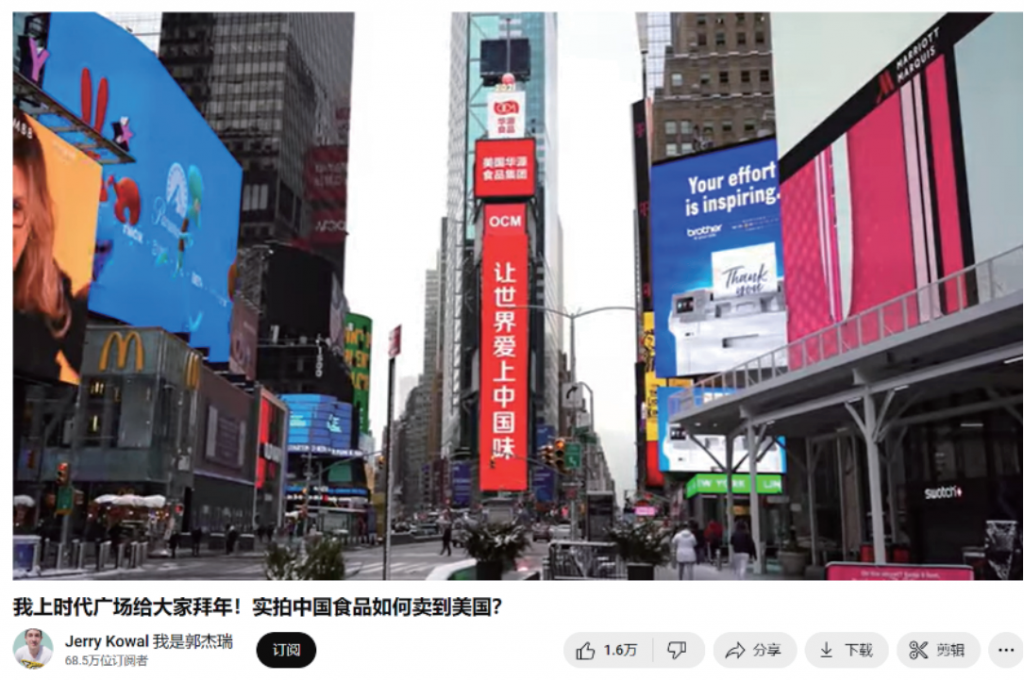
Illustration 2.5 Chinese Brands Landing on New York Times Square
From several million dollars to over 100 million dollars, from Los Angeles to the whole
United States, from offline retailers to omni-channel, OCM achieved exponential
growth, becoming the largest Chinese food and drinks distributor in the United States
within a few years. The success is not only attributed to seize the trend by learning
from JFC, but also to choose the right timing in tapping into the opportunities created
by increasing population of Asian Americans, especially the new immigrants from
mainland China.








